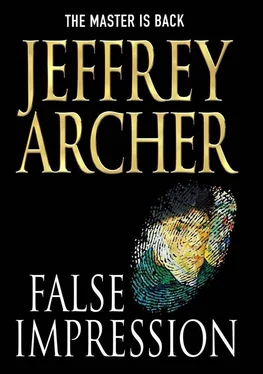Jack hadn’t found it difficult to obtain a search warrant for Anna’s apartment while she remained on the missing list. After all, relatives and friends needed to be contacted to find out if she had been in touch with them. And then there was the outside possibility, Jack had argued in front of a judge, that she might be locked in her apartment, recovering from the ordeal. The judge signed the order without too many questions.
“I hope you find her,” he said, a sentiment His Honor had cause to repeat several times that day.
Sam had burst into tears at just the mention of Anna’s name. He told Jack that he’d do anything to assist, accompanied him up to her apartment, and even opened the door.
Jack walked around the small, tidy apartment while Sam remained in the hallway. He didn’t learn a great deal more than he already knew. An address book confirmed her uncle’s number in Danville, Illinois, and an envelope showed her mother’s address in Bucharest. Perhaps the only real surprise was a small Picasso drawing hanging in the hallway, signed in pencil by the artist. He studied the matador and the bull more closely, and it certainly wasn’t a print. He couldn’t believe she’d stolen it and then left the drawing in the hall for everyone to admire. Or was the drawing a bonus from Fenston for helping him to acquire the Van Gogh? If it was, it would at least explain what she was up to now. And then he walked into the bedroom and saw the one clue that confirmed that Tina had been in the apartment on the evening of 9/11. By the side of Anna’s bed was a watch. Jack checked the time: 8:46.
Jack returned to the main room and glanced at a photograph on the corner of the writing desk of what must have been Anna with her parents. He opened a box file to discover a bundle of letters that he couldn’t read. Most of them were signed “Mama,” although one or two were from someone called Anton. Jack wondered if he was a relation or a friend. He looked back up at the photograph and couldn’t help thinking that if his mother had seen the picture, she would have invited Anna back to sample her Irish stew.
“Damn,” said Jack, loud enough for the cab driver to ask, “What’s the problem?”
“I forgot to phone my mother.”
“Then you’re in big trouble,” said the driver. “I should know, I’m Irish too.”
Hell, is it that obvious, thought Jack. Mind you, he should have called his mother to let her know that he wouldn’t be able to make “Irish stew night,” when he usually joined his parents to celebrate the natural superiority of the Gaelic race over all God’s other creatures. It didn’t help that he was an only child. He must try to remember to call her from London.
His father had wanted Jack to be a lawyer, and both his parents had made sacrifices to make it possible. After twenty-six years with the NYPD, Jack’s father had come to the conclusion that the only people who made a profit out of crime were the lawyers and the criminals, so he felt his son ought to make up his mind which he was going to be.
Despite his father’s cryptic advice, Jack signed up for the FBI only days after he had graduated from Columbia with a law degree. His father continued to grumble every Saturday about him not being a lawyer, and his mother kept asking if he was ever going to make her a grandmother.
Jack enjoyed every aspect of the job, from the first moment he arrived at Quantico for training, to joining the New York field office, to being promoted to senior investigating officer. He seemed to be the only person who was surprised when he was the first among his contemporaries to be promoted. Even his father begrudgingly congratulated him before he added, “Only proves what a damn good lawyer you would have made.”
Macy had also made it clear that he hoped Jack would take over from him once he was transferred back to Washington, D.C. But before that could happen, Jack still had to put in jail a man who was turning any such thoughts of promotion into fantasies. And so far, Jack had to admit, he hadn’t so much as landed a glove on Bryce Fenston, and was now having to rely on an amateur to deliver the knockout punch.
He stopped daydreaming and put a call through to his secretary.
“Sally, book me on the first available flight to London with an onward connection to Bucharest. I’m on my way home to pack.”
“I ought to warn you, Jack,” his secretary replied, “that JFK is stacked solid for the next week.”
“Sally, just get me on a plane to London, and I don’t care if I’m sitting next to the pilot.”
The rules were simple. Krantz stole a new cell phone every day. She’d phone the chairman once, only speak in their native tongue, and when the conversation was finished dispose of the phone. That way, no one could ever trace her.
Fenston was sitting at his desk when the little red light flashed on his private line. Only one person had that number. He picked up the phone.
“Where is she?”
“Bucharest,” was all he said, and then replaced the receiver.
Krantz dropped today’s cell phone into the Thames and hailed a cab.
“Gatwick.”
When Jack came down the steps at Heathrow, he wasn’t surprised to find Tom Crasanti standing on the runway waiting for him. A car was parked behind his old friend, engine running, the back door held open by another agent.
Neither of them spoke until the door was closed and the car was on the move.
“Where’s Petrescu?” was Jack’s first question.
“She’s landed in Bucharest.”
“And the painting?”
“She wheeled it out of customs on a baggage trolley,” said Tom.
“That woman’s got style.”
“Agreed,” said Tom, “but then perhaps she has no idea what she’s up against.”
“I suspect she’s about to find out,” said Jack, “because one thing’s for sure, if she stole the painting, I won’t be the only person out there looking for her.”
“Then you’ll have to keep an eye out for them as well,” said Tom.
“You’re right about that,” said Jack, “and that’s assuming I get to Bucharest before she’s moved on to her next destination.”
“Then there’s no time to waste,” said Tom, before adding, “We’ve got a helicopter standing by to take you to Gatwick, and they’re holding up the flight to Bucharest for thirty minutes.”
“How did you manage that?” asked Jack.
“The helicopter is ours; the holdup is theirs. The ambassador called the Foreign Office. I don’t know what he said,” admitted Tom, as they came to a halt beside the helicopter, “but you’ve only got thirty minutes.”
“Thanks for everything,” said Jack, as he stepped out of the car and began to walk toward the helicopter.
“And try not to forget,” Tom shouted above the noise of the whirring blades, “we don’t have an official presence in Bucharest, so you’ll be on your own.”
Anna stepped onto the concourse of Otopeni, Bucharest’s international airport, in the early hours of the morning, pushing a trolley laden with a wooden crate, a large case, and a laptop. She stopped in her tracks when she saw a man rushing toward her.
Anna stared at him suspiciously. He was around five nine, balding, with a ruddy complexion and a thick black moustache. He must have been over sixty. He wore a tight-fitting suit, which suggested he’d once been slimmer. He came to a halt in front of Anna.
“I’m Sergei,” he announced in his native tongue. “Anton told me you’d called and asked to be picked up. He has already booked you into a small hotel downtown.” Sergei took Anna’s trolley and pushed it toward his waiting taxi. He opened the back door of a yellow Mercedes that already had three hundred thousand miles on the clock, and waited until Anna had stepped in before he loaded her luggage into the trunk and took his place behind the wheel.
Читать дальше












